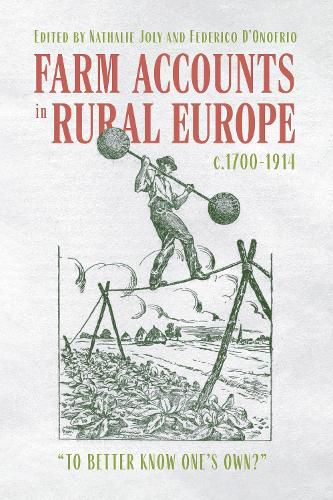Readings Newsletter
Become a Readings Member to make your shopping experience even easier.
Sign in or sign up for free!
You’re not far away from qualifying for FREE standard shipping within Australia
You’ve qualified for FREE standard shipping within Australia
The cart is loading…






Analyses how book-keeping and estate accounting transformed attitudes and practices in farm management over three centuries of European history.
From the eighteenth until well into the twentieth century, an ideal model developed of a farmer as accountant, who would record economic transactions meticulously; tidy book-keeping was regarded as the basis of sound management, and only those who accurately dealt with finances would survive and thrive. It is clear that this happened in both theory and practice, with growing numbers of farmers (men and women) keeping increasingly formalized records of their businesses during this period; a wide range of valuable documentation, originating from large estates, small sharecroppers, tenant and owner-farmers alike, has survived.
Drawing on that rich body of sources, this book examines book-keeping and account practices in farm management across Europe, with case studies ranging from Westphalia and the Rhineland to France and Switzerland, over three centuries. It considers who kept these records and their motivations, how practices changed and developed across the period, and in what ways and to what extent accounts and accounting influenced the development of agriculture. It also examines the role of farmers' own organisations and government in encouraging higher standards of accounting.
The Introduction and chapters 7 and 9 are available as Open Access under the Creative Commons licence CC BY-NC-ND.
$9.00 standard shipping within Australia
FREE standard shipping within Australia for orders over $100.00
Express & International shipping calculated at checkout
Analyses how book-keeping and estate accounting transformed attitudes and practices in farm management over three centuries of European history.
From the eighteenth until well into the twentieth century, an ideal model developed of a farmer as accountant, who would record economic transactions meticulously; tidy book-keeping was regarded as the basis of sound management, and only those who accurately dealt with finances would survive and thrive. It is clear that this happened in both theory and practice, with growing numbers of farmers (men and women) keeping increasingly formalized records of their businesses during this period; a wide range of valuable documentation, originating from large estates, small sharecroppers, tenant and owner-farmers alike, has survived.
Drawing on that rich body of sources, this book examines book-keeping and account practices in farm management across Europe, with case studies ranging from Westphalia and the Rhineland to France and Switzerland, over three centuries. It considers who kept these records and their motivations, how practices changed and developed across the period, and in what ways and to what extent accounts and accounting influenced the development of agriculture. It also examines the role of farmers' own organisations and government in encouraging higher standards of accounting.
The Introduction and chapters 7 and 9 are available as Open Access under the Creative Commons licence CC BY-NC-ND.